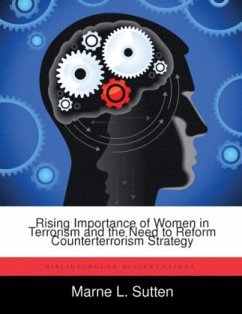It is evident that women are increasingly playing a role in terrorism. The war on terror has restricted freedom of action within the security environment for terrorist organizations, making it more advantageous for terrorist organizations to use women to support or execute terrorist activities. In countries where terrorism originates and extremist organizations find safe haven and freedom of movement, the social environment also can play a significant role in leading women towards supporting terrorism. Discriminatory religious and social customs in these same countries leave women as a largely untapped resource in supporting the ideological causes of terrorist organizations. Female terrorist acts can also generate much greater media attention than those conducted by males, further encouraging terrorist organizations to expanding recruiting of women. Counterterrorism strategies tend to ignore gender as a relevant factor, and in doing so exclusively focus on male imposed threats. Although women taking part in terrorist and extremist acts is not new and dates many years, their presence in terrorist organizations as both leaders and executors is increasing around the globe. It is important that the U.S. and regional combatant commands integrate gender into national and military counterterrorism strategy to address this alarming trend. The purpose of this monograph is to examine the role of the female gender in terrorism and in terrorist organizations, and to determine if U.S. counterterrorism strategy should specifically address women. The main hypothesis is that approaching counterterrorism strategy with a perspective on the female gender as well as the male gender will have a positive impact on the ability of the U.S. to combat terrorism in the long war. The monograph concludes with several recommendations for national policy and counterterrorism strategy that address the role of women in terrorism. It is important that extensive cultural analysis be conducted in a s
Hinweis: Dieser Artikel kann nur an eine deutsche Lieferadresse ausgeliefert werden.
Hinweis: Dieser Artikel kann nur an eine deutsche Lieferadresse ausgeliefert werden.








